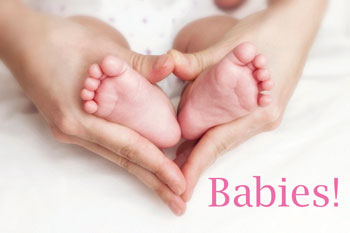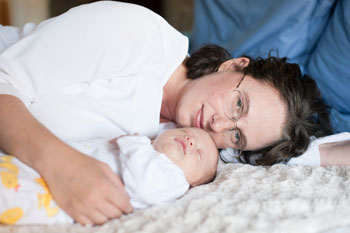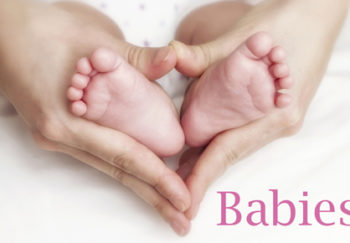Soon after the Royal Family announced Kate Middleton’s pregnancy, hyperemesis gravidarum began making headlines. Many had never heard of the condition before, but women who get it experience such severe nausea and vomiting that they may need to be hospitalized.

Hyperemesis is rare, but knowing the symptoms and communicating with your doctor can lead to a healthier and happier pregnancy.
Strange Symptoms in Pregnancy: What to Do
Many pregnancy-related conditions have no risk factors, so it can be hard to know if your lower back pain or itchy hand is normal or something more serious. “This is why patient education and regular contact with your provider ends up being so important,” says Christian Chisholm, MD, a specialist in high-risk pregnancies.
Talk to your provider about symptoms that concern you. At UVA, maternity patients can call a doctor or nurse 24/7.
Cancer During Pregnancy: One Mom’s Story
Two weeks after learning she was pregnant with her third child, Amber Young found out she had thyroid cancer.
She had no symptoms. Instead, Young, 36, sought out her dermatologist for a painful mole. He referred her to a plastic surgery specialist, who found a nodule on the right side of her thyroid and promptly scheduled an ultrasound.
That nodule turned out to be benign, but she had another one on the left side. It was a small tumor.
Fortunately, it hadn’t spread to other parts of her body. Doctors believed it had developed recently and had no link to her pregnancy. Her surgeon, John Hanks, MD, operates on several pregnant women a year and worked closely with Young’s obstetrician.
In her second trimester, Amber had a thyroidectomy, surgery to remove her thyroid. Five months later, she gave birth to a healthy baby boy, Elijah.

Amber isn’t done with her treatment. She continues to see her oncologist, James Boyer, MD, at UVA Hope Cancer Care Charlottesville. She’s waiting until she finishes breastfeeding before receiving a radioactive iodine treatment, a form of radiation therapy where she becomes radioactive and won’t be able to be around her children. And she’ll be taking medicine for the rest of her life.
Meanwhile, she’s enjoying life with Elijah and her two older children and husband.
Unusual Conditions in Pregnancy
Amber’s cancer had nothing to do with her pregnancy, but you may be surprised by other pregnancy-related conditions. Here are a few more to be aware of:
Preterm Labor
Preterm labor occurs before the 37th week of the pregnancy. It’s “the leading cause of infant mortality, and about 50 percent of women who deliver preterm don’t have any identifiable risk factors,” Chisholm says.
Teens are more likely to have premature babies. Other risk factors include:
- Previously having a premature baby
- Excess amniotic fluid (the fluid surrounding the fetus)
- Being pregnant with twins or other multiples
Symptoms of premature labor include:
- Contractions
- Bleeding or a mucousy discharge
- A vague sensation of pressure in the pelvis
- Lower back discomfort
Preeclampsia
If you have hypertension, also known as high blood pressure, prior to pregnancy, you’ll work with your doctor from the start to manage it. But some women develop preeclampsia, a combination of hypertension and protein in the urine, in the third trimester. (Read one mom’s preeclampsia story.)
Preeclampsia may progress into eclampsia, or seizures during pregnancy, and is associated with poor growth of the fetus, placental abruption (separation of the placenta from the uterus, which causes bleeding from the placenta) and damage to the mother’s kidneys, liver and other organs.
Doctors must monitor patients with preeclampsia carefully to avoid eclampsia and other complications. In some cases, the baby may need to be delivered early.
HELLP Syndrome
HELLP syndrome is a form of severe preeclamsia. It can destroy the mother’s red blood cells, damage her liver or cause severe bleeding.
According to Chisholm: “It’s associated with a higher rate of severe complications for both mother and baby, including premature birth and blood loss at the time of delivery.”
Cholestasis
“Profound generalized itching without a rash.” That’s how Chisholm describes cholestasis. The itching is often on the palms of your hands and soles of your feet.
This uncomfortable condition occurs when the expecting mother’s liver isn’t processing bile normally, leading to increased bile acids in the mother’s blood.
“Mainly we worry about the baby because there are reports that stillbirth occurs more commonly when the woman has cholestasis of pregnancy, for reasons that are not fully understood,” Chisholm says. “In more severe cases, permanent liver damage could also occur.” Doctors manage the condition with medication and careful fetal monitoring.
PEP/PUPP
Some people call it PUPP, others PEP, but both terms refer to an itchy, slightly raised rash. Doctors don’t know the cause, but the rash doesn’t cause any other problems for the mother or baby and doctors prescribe antihistamines to treat.
Even with treatment, “for some women the itching can be almost disabling,” Chisholm says. The itching and rash may continue after delivery for six months or even longer.
Pica
Expecting moms with pica crave non-food substances such as ice, clay, powdered laundry starch and dirt. Chisholm says often the woman has an underlying iron deficiency, but this condition is not well understood.
Tell Us Your Story
Did you develop one of these conditions while pregnant? Leave a comment below to share your story.

